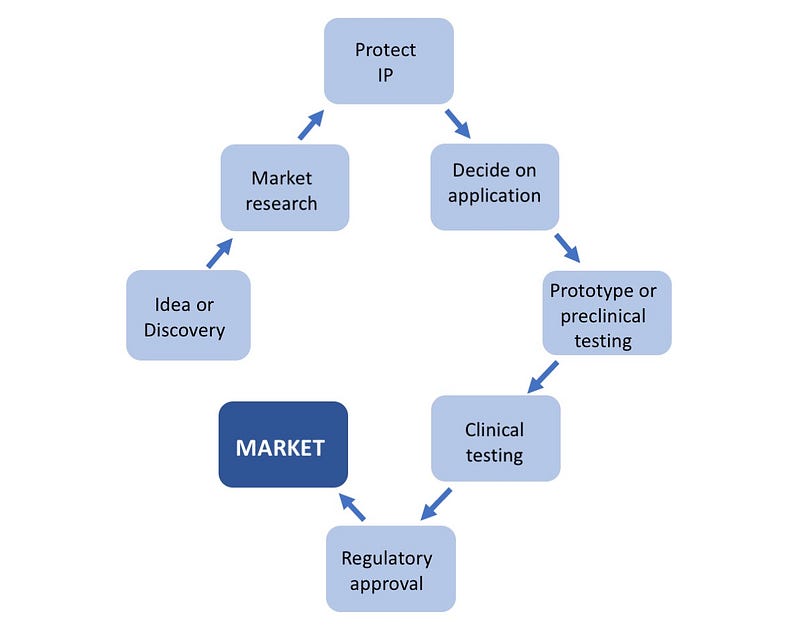The Career Series: Can Your Science Be Commercialized?

Not all science can or should be commercialized. If you are a new entrepreneur, or a scientist thinking about becoming an entrepreneur, it isn’t always easy to work out whether research could be turned into a successful business.
Here are the basic steps to turn science into a product:

It takes years and millions of dollars to turn that flow chart into reality. How can you decide whether it is worth spending the time and money trying to commercialize a particular technology?
If you work or study at a university or research institution, your Technology Transfer Office (TTO) can help you with this. In fact, you have to let them drive the commercialization process. Since the Bayh-Dole Act was passed in 1980, universities and non-profit research institutes in the US own any technology arising from federally-funded research at their facilities. This law requires universities and institutes to patent any useful inventions that they own and to license that technology to interested commercial partners. In Europe, many universities and research institutes have similar intellectual property rights in place.
If your work was sponsored by a company through a Sponsored Research Agreement or contract, the sponsoring company may have the first right to refuse licensing any resulting IP or they may have a time window in which they can negotiate to license any technology.
Some institutions claim ownership of discoveries coming from any work done by their employees, regardless of where it was done, so make sure you check your employment contract before doing work in a Community Lab or other premises.
For any discoveries made at a university or research institution, report your IP to your TTO and they will assess the commerciability of your discovery and work with you on drafting patent claims. If they do decide to patent it, you may be able to negotiate later to license the technology back from them so you can commercialize it.
If you are a solo entrepreneur who invented your technology outside of a company or research organization, these are the steps to work out whether your technology can be commercialized:
Who owns it? Was it derived from your previous job?
How strong is the science?
Can you defend your IP and how will you do so?
What products, platforms or services can you create from your science?
Is there a market need for these applications?
What is your market size?
Who are your competitors?
How difficult/expensive will it be to develop these applications?
Do you own it?
Ownership of a scientific invention comes down to three things: who did the work; where the work took place and who paid for it. If you did the work in independent lab space such as a community lab, incubator or accelerator and you paid for it, then you are the owner.
To stay away from sticky ownership fights, make sure you read the fine print in any contract you sign with an independent lab. If they don’t have a clear ownership policy or contract, you might want to draft one and ask them to sign it. Also use Material Transfer Agreements (MTAs) if using materials from collaborators or other researchers. These should clearly state who is using what and who owns any IP resulting from the use of these materials.
If you are still working at a university or research institution while doing your independent work, you may need to sign a consulting agreement with them to be sure that they don’t have an ownership claim to any of your IP. Whether or not this is possible depends on the source of your funding and varies from institution to institution so check with your TTO or your human resources department. Also, if you are an expat working on a visa, you have to follow different rules, so check out the rules specific to your visa before you spend time and money on creating independent work. You may not be allowed to do so under your visa regulations.
You may be able to ask your institution for a non-assert letter stating they will not contest ownership of your IP. Naresh Sunkara developed the technology for his company Nosocom Solutions while he was a postdoc at the University of California, Berkeley. He did his work at independent facilities outside of the university. He told Berkeley what he was doing and they wrote a letter for him starting that the university had no ownership rights over his technology.
How strong is the science?
Pharmaceutical companies conduct research in a very different way from most academic labs. Their end goal is to create products and platforms. This means that all research must be well documented and reproducible. Otherwise the company could spend millions or billions of dollars and many years running down dead-end paths. Companies want to get to a ago/no-go decision’ as fast as possible to save time and money. They are biased towards no. Academic labs on the other hand, are often trying to find new knowledge, not create products. They are biased towards yes.
As basic research funding dwindles, many universities and institutions are moving towards atranslational research’ so many more academic researchers will need to think about how their work can be turned into products.
If you want to go down the harrowing road of spinning out a startup company based on your research, you need to know that the science is solid. This is one of the first questions that early stage investors will ask.They want to know that you have novel technology that can be used to make a product that solves a problem for a big market. Peer review of your work can provide some external validation of your science. Securing grant funding, winning business competitions and being accepted into an incubator or accelerator program all involve peer review of your science.
If you are at the earliest stage of your entrepreneurship journey, and haven’t yet had the chance to apply for grants or enter competitions, you need to objectively assess the quality of your science. It might help to ask a couple of colleagues to do this, particularly if they are well known in your field. These same colleagues may write you letters of support to strengthen your grant applications or investment pitch.
Investors will analyze your data themselves. They will look at the robustness of any patents and academic publications. They will also assess the strength of your scientific advisory board.
More information
This article is an excerpt from my book aHow to Start a Life Science Company’. The pre-release eBook is available on Amazon now. It covers all the concepts outlined in this article in more detail and offers a blueprint of how a first-time entrepreneur can start a successful life science company: https://www.amazon.com/Start-Life-Science-Company-Comprehensive-ebook/dp/B076LHRNZS/
T his article was originally posted on the Life Science Network and was written by Leah Cannon, a Career Advisory Council member at the Graduate School of Biomedical Sciences and the content editor for Life Science Network.
his article was originally posted on the Life Science Network and was written by Leah Cannon, a Career Advisory Council member at the Graduate School of Biomedical Sciences and the content editor for Life Science Network.
